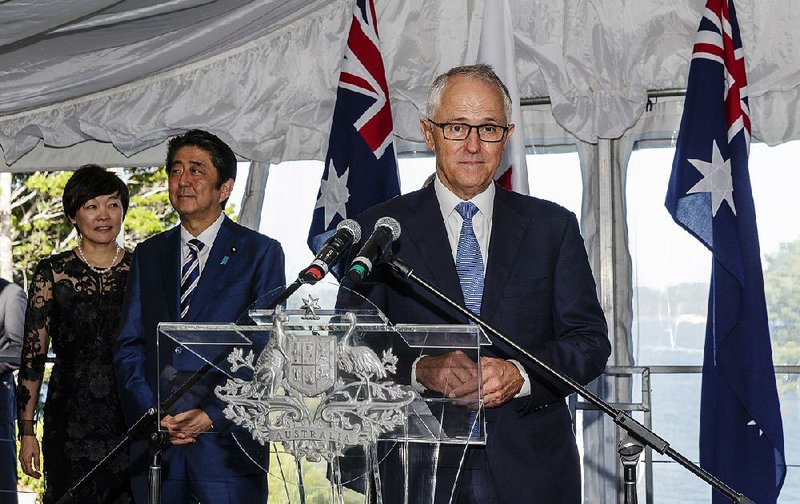SYDNEY -- The leaders of Australia and Japan agreed Saturday to boost cooperation between their militaries, as Japan tries to shore up security ties throughout the Asia-Pacific region amid concern over China's growing military might.
Japanese Prime Minister Shinzo Abe and his Australian counterpart Malcolm Turnbull said they had signed an upgraded defense agreement after talks in Sydney on trade and regional security issues. The leaders said the pact would allow their militaries to provide each other with logistical support during exercises, and they are working toward an agreement that would make it easier to participate in joint military exercises.
"The relationship between Australia and Japan is closer, stronger and more constructive than ever," Turnbull said.
Abe arrived in Sydney from the Philippines on Friday on the second leg of a four-nation swing intended to boost Japan's trade and security engagements amid China's emergence as a military power in the Pacific. After Australia, he visits Indonesia and Vietnam.
After their meeting, Abe said the countries would enhance their coordination on activity in the disputed South China Sea and the nuclear threat posed by North Korea.
"In a situation where there is increasing uncertainty and nebulousness on the political, security and economic scenes, it is important to guard and increase the robustness of the free, open and rules-based international order," Abe said. "It is more necessary than ever before for Japan and Australia as special strategic partners to play a leading role for regional peace and prosperity."
On the South China Sea, Turnbull said he "urged all parties to exercise self-restraint, and to avoid actions that would escalate tensions, including the militarization of outposts in the South China Sea."
China and Vietnam, in a separate accord, pledged to manage their maritime differences and safeguard peace and stability in the South China Sea, China's Xinhua news agency said Saturday. The two governments agreed to avoid any acts that could escalate tensions, according to a communique.
Rex Tillerson, the U.S. secretary of state nominee, told the Senate last week that he was in favor of blocking China's access to artificial islands it was building in the South China Sea, and that U.S. allies in the region should provide backup in this task.
Former Australian premier Paul Keating said Tillerson was threatening to involve Australia in a war with China, describing his comments as "simply ludicrous."
Abe and Turnbull also reaffirmed their support for the Trans-Pacific Partnership agreement, the 12-nation trade pact that incoming President Donald Trump has vowed to scrap. Still, both noted the importance of maintaining their relationships with the United States and pledged to work constructively with the new administration.
"For both of our nations, the United States remains the cornerstone of our strategic and security arrangements," Turnbull said. "And our respective alliances for the United States are as relevant and important today as they have ever been. We'll work closely with the incoming administration ... to advance the region's interests and our shared goals."
Before arriving in Sydney, Abe visited the Philippines where he pledged $8.7 billion worth of business opportunities and private investments along with equipment to fight terrorism.
Information for this article was contributed by Kristen Gelineau of The Associated Press and James Thornhill and Linly Lin of Bloomberg News.
A Section on 01/15/2017

